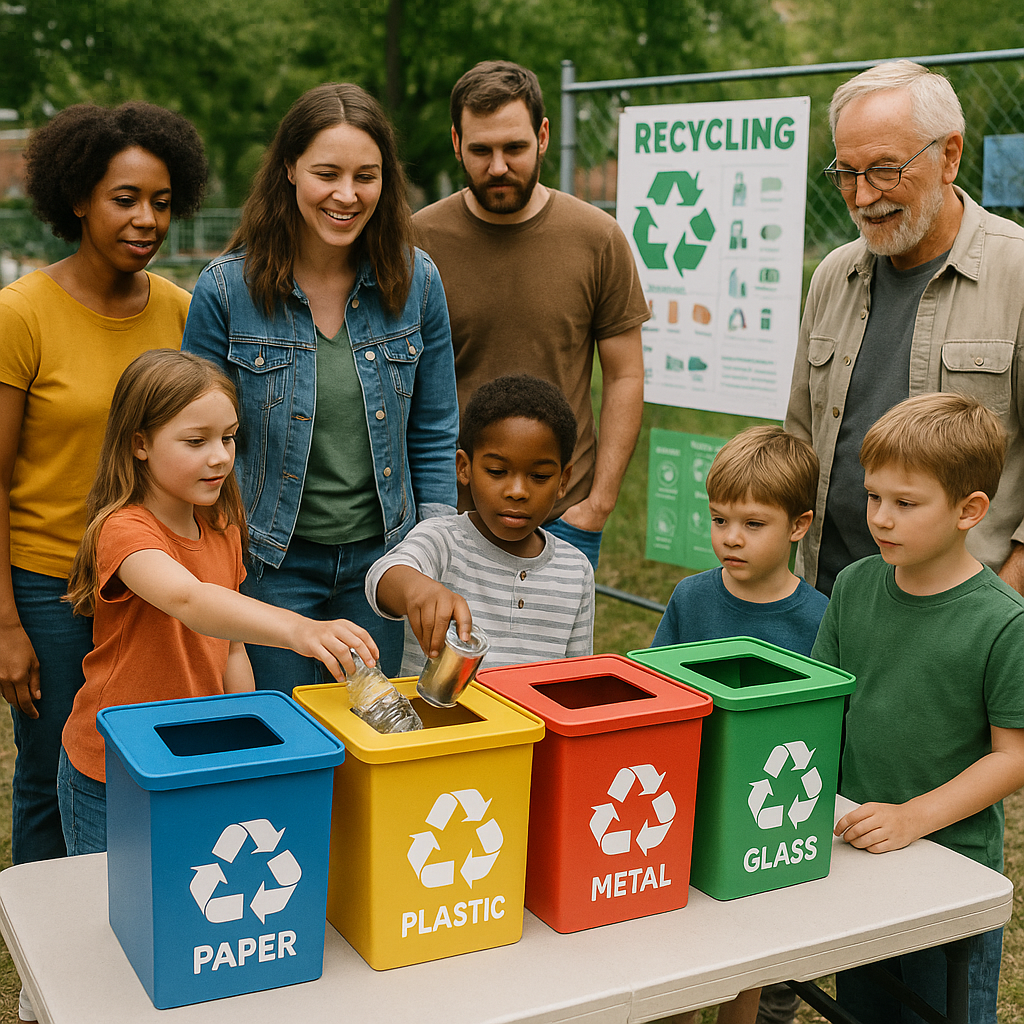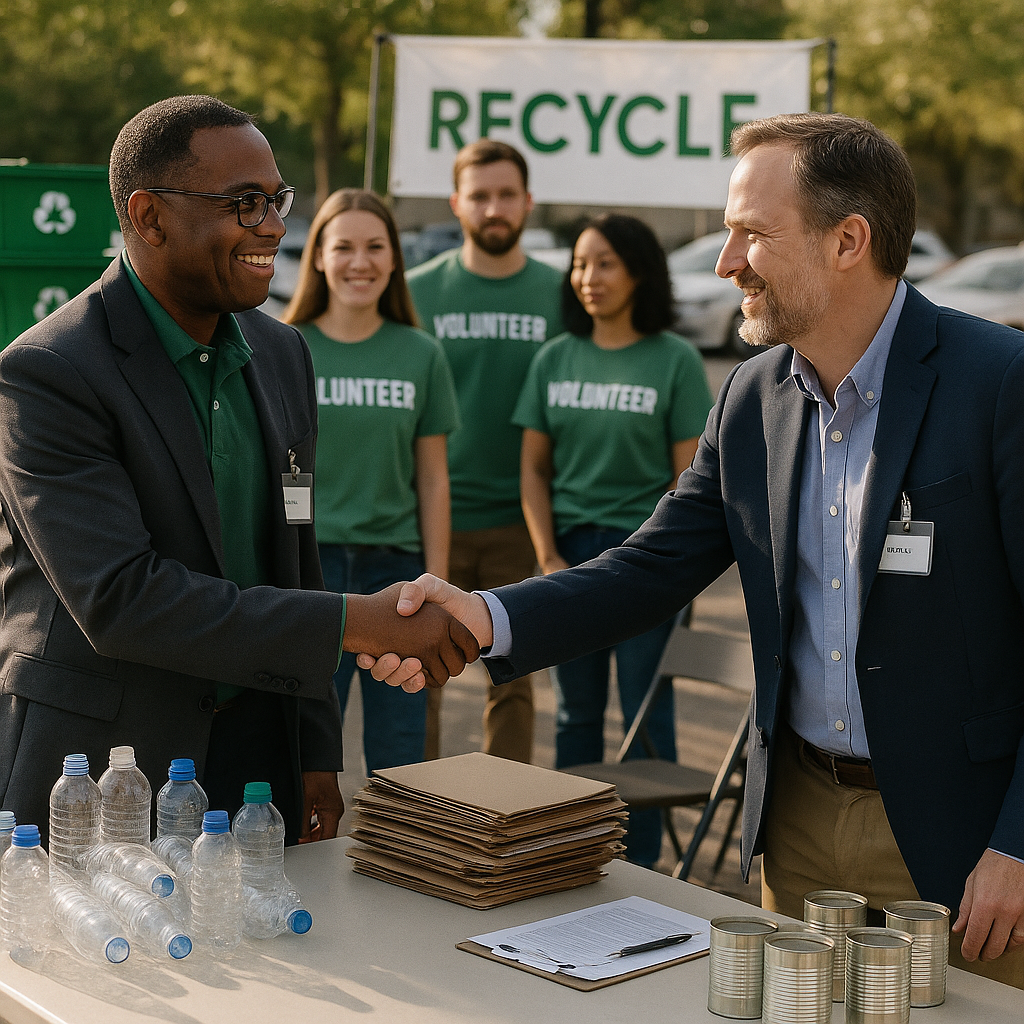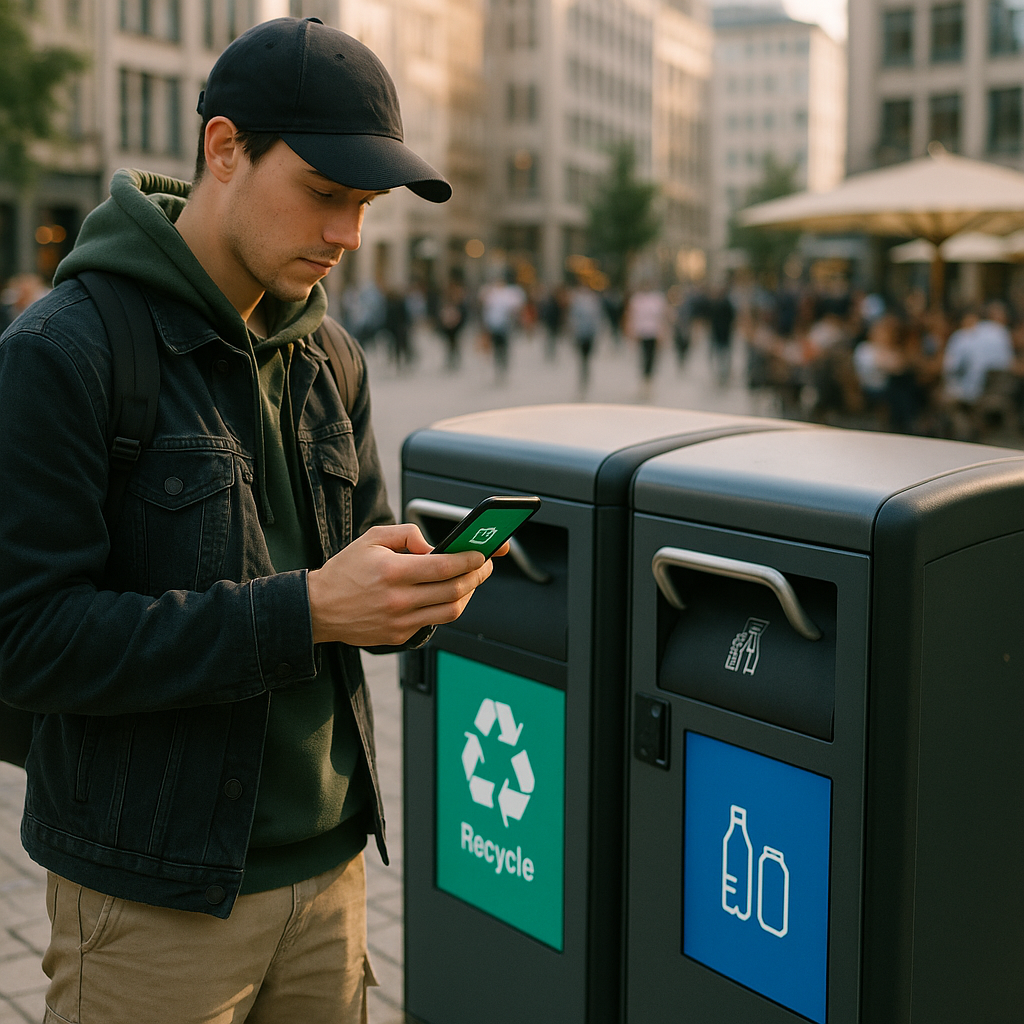5901 Botham Jean Blvd, Dallas, TX 75215
What is Eco-conscious Scrap Recycling for Towns?
June 15, 2025Each year, nearly 11 million tons of metal waste end up in landfills across the United States, representing a significant loss of valuable resources and a missed opportunity for communities. Eco-conscious scrap recycling for towns is a strategic approach that transforms routine metal collection into meaningful community engagement. These programs go beyond traditional recycling by creating structured initiatives that increase participation while delivering environmental, economic, and social benefits.
Eco-conscious scrap recycling involves implementing thoughtful collection systems and educational campaigns that make metal recycling more accessible and appealing to residents. Towns adopting these approaches typically see higher participation rates because they address common barriers like convenience and awareness while highlighting the direct environmental impact of recycling metals versus disposing of them.
These community-centered recycling initiatives create shared experiences that strengthen local connections. By framing metal recycling as a collective effort toward sustainability rather than just an individual responsibility, towns can build programs that resonate with residents’ values while delivering measurable environmental benefits. The most successful programs connect recycling actions to tangible outcomes that matter to participants, such as reduced landfill use, conservation of natural resources, and support for the local economy.
What Financial Incentives Boost Community Recycling?

Community-focused financial incentives are powerful drivers of recycling participation. Unlike individual rewards, these incentives motivate collectively by channeling recycling proceeds into neighborhood improvements that benefit everyone.
When communities witness tangible results from recycling efforts, participation rates usually rise. The direct link between recycling actions and community enhancement fosters both environmental responsibility and local pride.
Community Project Funding Models
Scrap drive fundraisers are among the most effective community incentive approaches. These events collect recyclable materials like metals, electronics, and paper. Instead of rewarding individuals, proceeds fund specific community needs.
Local governments enhance these initiatives by offering matching funds. When municipalities match proceeds from community recycling efforts, they effectively double the impact, demonstrating institutional support for grassroots recycling programs.
Research shows financial incentives significantly influence recycling behavior. Communities should tailor their approach based on local conditions and needs. Successful programs maintain transparency about fund usage and community benefits.
Successful Community Projects
Playground equipment purchases are popular uses of recycling proceeds. Communities can link their recycling efforts to new slides, swings, and climbing structures. These visible rewards provide immediate gratification to participants.
Community gardens funded through recycling initiatives offer both environmental and social benefits, creating green spaces and producing local food. Residents can see the results of their recycling efforts growing in their neighborhoods.
Environmental education programs funded by recycling proceeds foster sustainable behavior changes. These initiatives teach future generations about waste reduction and resource conservation. Schools often use funds for field trips, educational materials, and hands-on learning activities.
Public space improvements like benches, trash receptacles, and beautification projects provide visible benefits from recycling income. These enhancements improve quality of life while reinforcing the community benefits of recycling participation.
Implementation Strategies
Successful community incentive programs require clear communication about goals and benefits. Residents need to understand how their participation directly contributes to improvements. Regular updates on collection totals, proceeds, and funded projects help maintain engagement.
Business partnerships can enhance community recycling incentives. Local companies often offer matching donations or in-kind contributions to recycling-funded projects, amplifying the impact of community recycling efforts.
Public celebrations of completed projects create awareness and appreciation. Events showcasing new playground equipment, garden spaces, or other improvements highlight the connection between recycling and community benefits.
Small communities can implement cooperative collection initiatives with neighboring towns. This approach pools resources to increase recycling volume and efficiency. Shared proceeds can fund projects benefiting multiple communities, extending the impact of recycling incentives.
| Incentive Type | Community Benefit |
|---|---|
| Scrap drive fundraisers | Funds specific community needs |
| Local government matching funds | Amplifies impact of recycling efforts |
| Playground equipment purchases | Directly linked to recycling efforts |
| Community gardens | Creates green areas and local food |
| Environmental education programs | Fosters sustainable behavior changes |
| Public space improvements | Improves quality of life |
How Do Recognition-Based Incentives Promote Recycling?

Recognition-based incentives leverage our desire for social approval and community belonging. Unlike financial rewards, these incentives transform recycling from a solitary task into a public achievement. Public acknowledgment of recycling efforts creates powerful social motivation that can drive sustainable behavior across communities.
Public recognition through local media is an effective way to highlight recycling champions. Communities that feature top recyclers in newspapers, social media, or newsletters create visible role models. This visibility turns everyday recycling actions into noteworthy achievements. Seoul exemplifies this approach by tracking residents’ recycling contributions and publicly recognizing top performers, fostering a culture where recycling excellence is celebrated.
Appreciation events provide opportunities to collectively celebrate recycling successes. Annual ceremonies where certificates, plaques, or trophies are presented to dedicated recyclers reinforce the value of environmental stewardship. These gatherings strengthen community bonds around shared sustainability goals while acknowledging individual contributions.
Types of Recognition Incentives
- Community Recycling Challenge Leaderboards – Public displays tracking neighborhood or individual recycling rates create friendly competition while showcasing progress toward collective goals.
- Recycling Champion Programs – Monthly or quarterly recognition of “Top Recyclers” maintains steady engagement and encourages consistent participation.
- Social Media Spotlights – Creating dedicated hashtags for community recycling efforts enables residents to share their contributions and receive public acknowledgment.
- Yard Signs and Window Decals – Visual symbols identifying households or businesses as “Recycling Champions” serve as daily reminders of community values.
- School and Business Recognition – Competitions between classrooms or departments generate enthusiasm while spreading sustainable practices.
Monthly or quarterly recognition programs maintain momentum for recycling initiatives. Regular acknowledgment of “Top Recyclers” in community spaces keeps engagement steady and encourages healthy competition. These consistent recognition cycles keep recycling at the forefront of community consciousness and provide regular opportunities for new participants to be celebrated.
Social media campaigns use digital platforms to amplify recycling success stories. Creating dedicated hashtags for community recycling efforts enables residents to share their contributions and build an online community around sustainability. These digital acknowledgments extend the reach of recognition programs and engage younger demographics who might otherwise be difficult to reach through traditional channels.
Community-wide recycling challenges with public leaderboards combine recognition with friendly competition. Towns or neighborhoods compete to achieve the highest recycling rates, with progress tracked in visible locations. Winners receive public acknowledgment and sometimes grants for community environmental projects. This approach motivates entire neighborhoods to work together toward common sustainability goals.
The most effective recognition programs share key characteristics: they are consistent, visible, and authentic. Recognition must be regular enough to maintain interest but selective enough to remain meaningful. It should be prominently displayed where community members will notice it, and it must genuinely celebrate real achievements rather than token participation.
When community members see their neighbors celebrated for recycling excellence, it normalizes these behaviors and establishes them as aspirational. Recognition programs don’t just reward current participants—they inspire new ones, creating a self-reinforcing cycle of community engagement in environmental stewardship.
What Educational Incentives Promote Sustainable Recycling?

Educational incentives that link environmental action with academic advancement motivate students to engage in sustainable recycling. These programs offer tangible benefits that reward positive environmental behaviors, going beyond simple awareness campaigns.
Scholarship opportunities are among the most effective educational incentives. When institutions offer financial aid to students who demonstrate leadership in recycling initiatives, they connect environmental responsibility with academic futures. These scholarships not only alleviate financial burdens but also validate students’ commitment to sustainability.
School supply programs offer another practical incentive. Many communities have programs where schools receive essential classroom materials in exchange for meeting specific recycling targets. This approach benefits both individual students and entire educational institutions, reinforcing the value of collective environmental action.
Grants for environmental projects empower students to develop their own sustainability initiatives. When schools receive funding to implement student-designed recycling programs, young people gain valuable experience in project management and environmental leadership. These grants often support innovations that improve existing recycling systems within school communities.
Curriculum-based recycling programs integrate environmental education directly into academic subjects. Rather than treating recycling as an isolated topic, these programs weave sustainable concepts into science, mathematics, social studies, and art curricula. Students learn about waste management while developing critical thinking skills relevant to their coursework.
Community-sponsored scholarship initiatives foster collaboration between educational institutions and local businesses. When community organizations fund educational opportunities for environmentally conscious students, they create pathways to higher education while supporting local sustainability goals. These partnerships demonstrate the community-wide value placed on environmental stewardship.
Leadership development programs focused on environmental issues cultivate the next generation of sustainability advocates. Students in these programs gain confidence in public speaking, project coordination, and community engagement. The leadership skills developed through recycling initiatives transfer to many other areas of academic and professional life.
Environmental consciousness emerges naturally from educational incentive programs. When students connect their academic success with sustainable practices, they develop lasting habits that extend beyond their school years. The awareness fostered through these programs influences family recycling behaviors and creates ripple effects throughout communities.
Competitions and recognition programs motivate students through positive reinforcement. Schools that acknowledge outstanding participation in recycling activities through awards, certificates, or public recognition help normalize environmental responsibility. These acknowledgments celebrate students’ contributions while encouraging wider participation.
Technology-based incentives have also proven effective in engaging today’s digitally connected students. Mobile applications that gamify recycling activities or track environmental impact provide immediate feedback and create social connections around sustainability efforts. These technological approaches make recycling more accessible and appealing to young people.
The generational change in recycling habits resulting from educational incentives represents their most significant impact. When young people develop sustainable practices early in life, these behaviors become second nature. The students influenced by these programs today will shape environmental policies and practices for decades to come.
While scholarships and material rewards provide immediate motivation, the long-term benefits of educational incentives extend far beyond school environments. Students who participate in these programs often become environmental advocates in their communities and workplaces, amplifying the impact of their initial educational experiences.
| Incentive Type | Description | Impact |
|---|---|---|
| Scholarships | Financial aid for students demonstrating leadership in recycling initiatives | Connects environmental responsibility with academic futures |
| School Supply Programs | Schools receive classroom materials for meeting recycling targets | Benefits both students and educational institutions |
| Environmental Project Grants | Funding for student-designed sustainability initiatives | Develops project management and environmental leadership skills |
| Curriculum Integration | Weaving sustainable concepts into academic subjects | Develops critical thinking skills while teaching waste management |
| Community-Sponsored Scholarships | Local businesses fund educational opportunities for environmentally conscious students | Creates pathways to higher education while supporting sustainability |
| Leadership Development Programs | Training focused on environmental issues and advocacy | Cultivates the next generation of sustainability advocates |
| Competitions and Recognition | Awards and certificates for outstanding recycling participation | Normalizes environmental responsibility through positive reinforcement |
| Technology-Based Incentives | Mobile applications that gamify recycling activities | Provides immediate feedback and creates social connections |
How Can Digital Strategies Enhance Community Recycling Programs?

Digital strategies transform community recycling programs by removing participation barriers and boosting engagement. Social media platforms offer spaces where residents can share recycling tips and success stories, fostering a sense of collective responsibility and accountability.
Mobile applications simplify the recycling process. Apps with barcode scanning help users identify recyclable materials instantly, while GPS features guide residents to nearby recycling drop-off locations. Real-time notifications alert users to collection schedule changes due to holidays or weather.
Recycling apps address participation obstacles through intuitive design. Materials recognition technology helps users determine if an item is recyclable in their community. Digital sorting guides clarify which bin to use for different materials, and push notifications remind residents of upcoming collection days.
Social media campaigns significantly increase recycling participation rates. A Portland case study showed neighborhoods using competitive elements among residents improved correct disposal rates by 40%. This approach makes waste sorting an engaging community activity. Platforms like Facebook and Instagram are ideal for these friendly competitions.
Email newsletters deliver timely recycling information to community members, highlighting program changes, contamination issues, and success metrics. Regular updates maintain awareness and reinforce proper recycling habits. Newsletters also recognize outstanding participants, motivating continued engagement.
Leveraging Interactive Educational Content
Interactive educational content makes learning about recycling more engaging. Short videos demonstrating proper material preparation receive higher engagement than text instructions. Infographics simplify complex recycling concepts into digestible visual formats, helping to overcome knowledge gaps that prevent proper participation.
Social media groups dedicated to recycling foster community knowledge sharing and peer support. Members post questions about difficult-to-classify items and receive guidance. Success stories inspire others to improve recycling habits, extending the impact of formal education campaigns through ongoing peer learning.
Storytelling in digital campaigns creates emotional connections to recycling outcomes. Content showing the journey of materials from bin to new products helps residents understand the impact of their actions. Visual transformations of recycled materials demonstrate tangible results, increasing program buy-in and long-term commitment.
Measuring Impact Through Digital Analytics
Digital platforms provide valuable data for measuring recycling program effectiveness. Engagement metrics reveal which educational content resonates most with community members, and participation tracking identifies neighborhoods needing additional outreach. This data-driven approach allows continuous program refinement based on community behavior.
Financial incentives delivered through digital platforms boost participation rates. Mobile apps can track and reward consistent recycling habits with community perks or recognition. Point systems gamify the recycling experience, appealing to participants’ competitive nature, especially when combined with social recognition components.
Organizations implementing coordinated digital strategies see measurable improvements in recycling outcomes. Campaigns with visual content, clear calls to action, and consistent messaging drive higher engagement. The combination of convenience features and educational components addresses both practical and knowledge barriers.
| Feature | Impact on Community Engagement | Statistical Evidence |
|---|---|---|
| Point System | Encourages consistent engagement by offering redeemable points for each item recycled | 20-30% increase in participation rates |
| Gamification | Introduces competition through leaderboards and challenges | 40% boost in user activity |
| Community Challenges | Enhances collective responsibility by organizing collective recycling goals | 30% increase in material recovery rates |
| Mobile Applications | Improves community engagement through real-time feedback and tailored campaigns | Up to 40% higher user engagement |
| Blockchain Technology | Provides transparency and trust in tracking recycled materials | 35% increase in recycling accuracy |
NGOs and community organizations amplify recycling messages through their digital networks, lending credibility and extending reach beyond municipal channels. These partnerships multiply the impact of recycling campaigns through trusted community voices, creating a cohesive and persuasive message across platforms.
Conclusion: Maximizing Community Participation in Scrap Recycling

Communities that implement diverse recycling incentives establish a robust framework for environmental stewardship. Financial incentives directed toward visible community improvements create direct connections between recycling actions and neighborhood enhancement.
Recognition programs highlighting dedicated recyclers turn individual efforts into community achievements, while educational incentives like scholarships foster lasting connections between environmental responsibility and community advancement.
These complementary approaches, supported by strategic digital tools that simplify participation, work together to transform occasional recyclers into committed environmental advocates. The benefits extend beyond waste reduction to include conserved natural resources, reduced landfill use, and strengthened community bonds. For assistance with implementing effective recycling solutions in your community, contact Okon Recycling at 214-717-4083.
